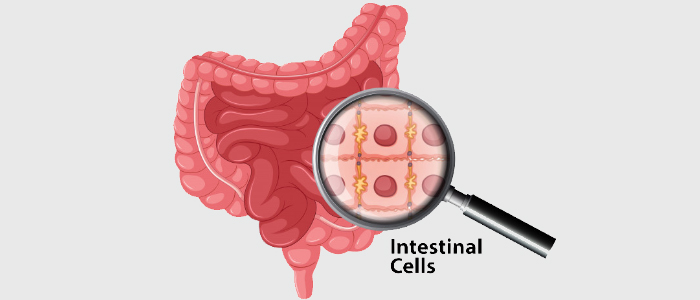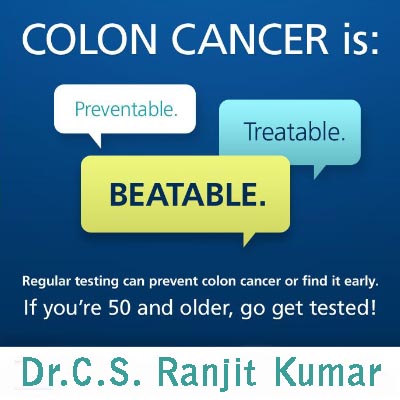Overview of Intestine Cancer
Intestine Cancer is also called as the Colon cancer. Small intestine cancer is a rare disease where cells in the tissue of the small intestine change. They grow out of control and can form a mass, or tumour. Colon cancer is cancer of the large intestine (colon), which is the final part of your digestive tract. Most cases of colon cancer begin as small, noncancerous (benign) clumps of cells called adenomatous polyps. Over time some of these polyps can become colon cancers. cancer genetic testing and counselling will give you awareness on cancer Dr CS Ranjit Kumar is best Intestine cancer specialist in Hyderabad, India. We do cancer screening test for each patient to make awareness on cancer.

The main types of small intestine cancer include
Adenocarcinomas is the most common type of small intestine cancer, usually develop in the cells that line the walls of the small intestine. Often, this type of cancer will develop out of small benign (noncancerous) growths called polyps.
Sarcoma is a type of intestinal cancer that develops in the connective tissue of the small intestine.
Gastrointestinal stromal tumours are variants of soft tissue sarcoma.
Carcinoid tumours form in the lining of the intestines and are often are slow growing.
Lymphomas are an immune system disease that may originate within the intestines.
Signs and symptoms of Colon Cancer
For the reason, the person is recommended with regular screening tests to help prevent colon cancer by identifying and removing polyps before they turn into cancer. Tumours in the small intestine may block the flow of food and affect digestion. As the Tumours gets bigger, the blockages may cause pain in the abdomen. Signs and symptoms of colon cancer include
- A change in your bowel habits, including diarrhoea or constipation or a change in the consistency of your stool, that lasts longer than four weeks.
- Rectal bleeding or blood in your stool.
- Persistent abdominal discomfort, such as cramps, gas or pain.
- A feeling that your bowel doesn't empty completely.
- Weakness or fatigue.
- Unexplained weight loss.
Stages of Colon Cancer:
Stage I
The cancer has grown through the superficial lining (mucosa) of the colon or rectum but hasn't spread beyond the colon wall or rectum.
Stage II
The cancer has grown into or through the wall of the colon or rectum but hasn't spread to nearby lymph nodes.
Stage III
The cancer has invaded nearby lymph nodes but isn't affecting other parts of your body yet.
Stage IV
The cancer has spread to distant sites, such as other organs — for instance, to your liver or lung.
Treatments for Colon Cancer:
Surgery for early-stage colon cancer
If your colon cancer is very small, you are recommended with a minimally invasive approach to surgery, such as
Removing polyps during a colonoscopy
If your cancer is small, localized and completely contained within a polyp and in a very early stage, your doctor may be able to remove it completely during a colonoscopy.
Endoscopic mucosal resection
Removing larger polyps may require also taking a small amount of the lining of the colon or rectum in a procedure called an endoscopic mucosal resection
Minimally invasive surgery
Polyps that can't be removed during a colonoscopy may be removed using laparoscopic surgery. In this procedure, your surgeon performs the operation through several small incisions in your abdominal wall, inserting instruments with attached cameras that display your colon on a video monitor. this may also help to take samples from lymph nodes in the area where the cancer is located.
Several Other treatments are done in the advanced stage of the cancer like Partial colectomy, Surgery to create a way for waste to leave your body, Chemotherapy, Radiation therapy, targeted drug therapy, Immunotherapy, Proton beam therapy and some advanced medications are given after the cancer diagnosis and help them to stay strong.
Brain Cancer Treatment Specialist

